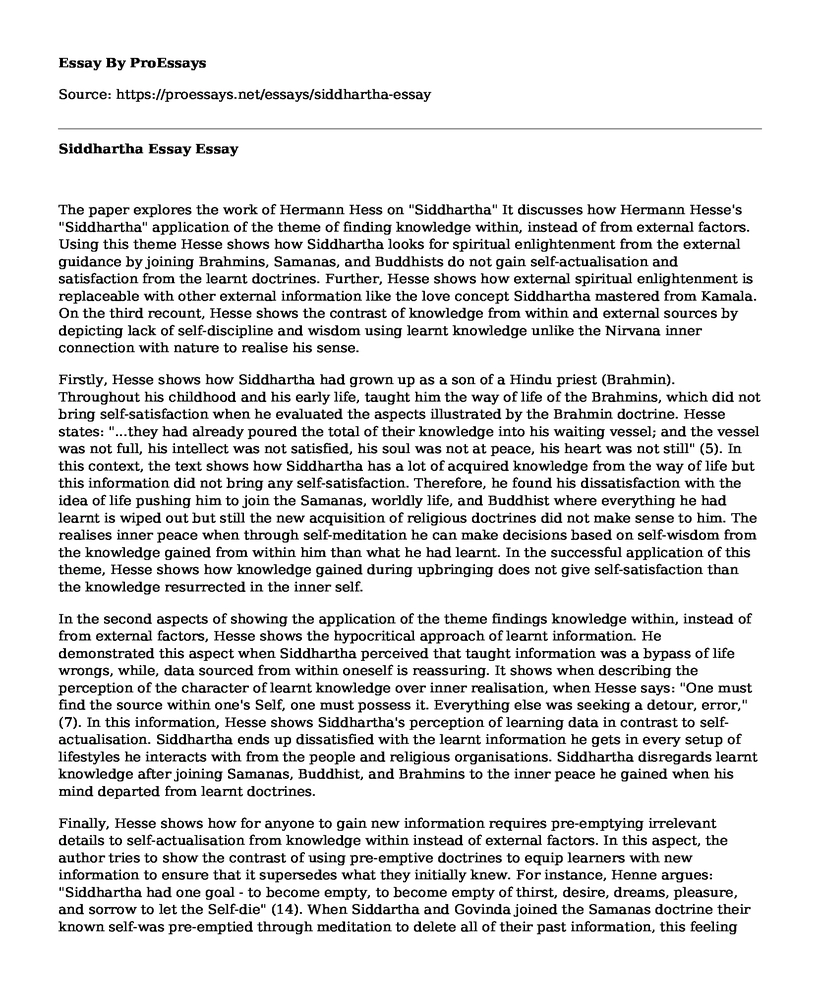The paper explores the work of Hermann Hess on "Siddhartha" It discusses how Hermann Hesse's "Siddhartha" application of the theme of finding knowledge within, instead of from external factors. Using this theme Hesse shows how Siddhartha looks for spiritual enlightenment from the external guidance by joining Brahmins, Samanas, and Buddhists do not gain self-actualisation and satisfaction from the learnt doctrines. Further, Hesse shows how external spiritual enlightenment is replaceable with other external information like the love concept Siddhartha mastered from Kamala. On the third recount, Hesse shows the contrast of knowledge from within and external sources by depicting lack of self-discipline and wisdom using learnt knowledge unlike the Nirvana inner connection with nature to realise his sense.
Firstly, Hesse shows how Siddhartha had grown up as a son of a Hindu priest (Brahmin). Throughout his childhood and his early life, taught him the way of life of the Brahmins, which did not bring self-satisfaction when he evaluated the aspects illustrated by the Brahmin doctrine. Hesse states: "...they had already poured the total of their knowledge into his waiting vessel; and the vessel was not full, his intellect was not satisfied, his soul was not at peace, his heart was not still" (5). In this context, the text shows how Siddhartha has a lot of acquired knowledge from the way of life but this information did not bring any self-satisfaction. Therefore, he found his dissatisfaction with the idea of life pushing him to join the Samanas, worldly life, and Buddhist where everything he had learnt is wiped out but still the new acquisition of religious doctrines did not make sense to him. The realises inner peace when through self-meditation he can make decisions based on self-wisdom from the knowledge gained from within him than what he had learnt. In the successful application of this theme, Hesse shows how knowledge gained during upbringing does not give self-satisfaction than the knowledge resurrected in the inner self.
In the second aspects of showing the application of the theme findings knowledge within, instead of from external factors, Hesse shows the hypocritical approach of learnt information. He demonstrated this aspect when Siddhartha perceived that taught information was a bypass of life wrongs, while, data sourced from within oneself is reassuring. It shows when describing the perception of the character of learnt knowledge over inner realisation, when Hesse says: "One must find the source within one's Self, one must possess it. Everything else was seeking a detour, error," (7). In this information, Hesse shows Siddhartha's perception of learning data in contrast to self-actualisation. Siddhartha ends up dissatisfied with the learnt information he gets in every setup of lifestyles he interacts with from the people and religious organisations. Siddhartha disregards learnt knowledge after joining Samanas, Buddhist, and Brahmins to the inner peace he gained when his mind departed from learnt doctrines.
Finally, Hesse shows how for anyone to gain new information requires pre-emptying irrelevant details to self-actualisation from knowledge within instead of external factors. In this aspect, the author tries to show the contrast of using pre-emptive doctrines to equip learners with new information to ensure that it supersedes what they initially knew. For instance, Henne argues: "Siddhartha had one goal - to become empty, to become empty of thirst, desire, dreams, pleasure, and sorrow to let the Self-die" (14). When Siddartha and Govinda joined the Samanas doctrine their known self-was pre-emptied through meditation to delete all of their past information, this feeling made Siddartha feel like he was dying slowly. The use of principles to kill self-awareness to give room to learning new beliefs, was so much pain than the peace attained when Siddhartha discarded learnt doctrines to soul-searching his wisdom Shmoop, 2008).Conclusion
In conclusion, Gained knowledge from life experiences or interaction with specific doctrines fail to give a person inner peace and self-actualisation despite the richness of the culture and therapeutically foundations of learnt information. However, the effect of listening to the illusion of inner voice reassures an individual to determine extensive understanding and interpretation of the natural happening in one's life. Therefore, Hesse depicted harrowing solitude to the contrast between the joy of self-perception and imposed knowledge of concepts.
Works Cited
Hesse, H. Siddhartha. New York: Bantam Press, 1972.
Shmoop Editorial Team. Siddhartha, 2008, November 11. Retrieved March 15, 2018, from https://www.shmoop.com/siddhartha.html
Cite this page
Siddhartha Essay. (2022, Apr 04). Retrieved from https://proessays.net/essays/siddhartha-essay
If you are the original author of this essay and no longer wish to have it published on the ProEssays website, please click below to request its removal:
- Character Analysis of The Great Gatsby
- Essay on Adventures of Huckleberry Finn by Mark Twain
- An Essay on Joyce James' Eveline Using Karen Horney's Neurosis Theory
- Literary Analysis Essay Thomas Hardy Works
- Essay Sample on James Baldwin: Intellectual, Activist, and Literary Icon
- Literary Analysis Essay on "Everyday Use" and "Dead Men's Path"
- Essay Example on Huck's Ordinary Life: Fear, Fight & Flight







